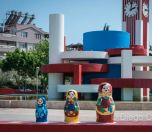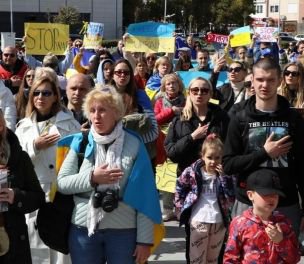Three months after Putin's mobilization, some of his citizens find a new home in Türkiye

Güneş Café in Kadıköy offers residence permit services to people from Russia. (Photo: Wouter Massink)
İstanbul has been a popular destination among tourists from Russia for decades. Advertisements in Cyrillic or being addressed in Russian are not uncommon in the city. However, the Cyrillic writing on the windows of Güneş Café is of a different kind. Not intended to sell gold, clothes, or a holiday trip but to offer services to help Russian speakers with their residence permits.
Located in Kadıköy, a hip district full of bars, restaurants, and coffee shops on the Asian side of the metropolis, Güneş Café is not the most stylish café in the area, nor does it intend to be. Facing the 123-year-old Hemdat Synagogue, barely visible through the damped windows from brewed Turkish tea, sold for a very reasonable 5 lira (0,25 Euro), the place has another trick up its sleeve: cheap residence permit consultancy offered by the owner of the café and his employee from Turkmenistan, who conveniently speaks both Turkish and Russian.
One of their clients is Dmitri, who lives in a shared flat a few blocks away from the café. Despite his relatively old age of 44, the IT engineer and pop musician did not want to risk being "morguelized" as he jokingly calls it, and left his spouse and children in Saint Petersburg at a moment's notice.
Dmitri describes the service of the café as "very helpful and affordable," with the lady from Turkmenistan accompanying him multiple times to the migration office.
A safe haven
Since the mobilization, Türkiye has become a safe haven for people leaving Russia. While many countries implemented sanctions on and blocked flights from Russia, Türkiye still abstains from sanctioning the country and lets its citizens in visa-free.
Many used this opportunity over the past months, whether for (semi)permanent relocation or holidays. Official data indicates that in the first 10 months of 2022, some 4.6 million people traveled from Russia to Türkiye, with around 800,000 arriving in September alone.
There is, however, a catch. Citizens of Russia are only allowed to stay up to 90 days in Türkiye on a tourist visa, meaning that many now find themselves at a crossroads. How many opt to stay indefinitely is unclear.
According to the Interior Ministry data, as of December 8, nearly 136,000 people from Russia were in Türkiye on a residence permit, making them the largest group of foreign residents residing in the country.
For Dmitri, currently waiting to get his residence permit, İstanbul is his new home for now. Before fleeing the mobilization, he and his family had already made plans to leave, making a scouting trip to Türkiye in the summer.
"I was thinking we would move together at the beginning of January. Because in December there are many concerts. There is quite a lot of money. All the papers were ready. We married in April. We couldn't do it earlier and didn't even tell our parents. They would want celebrations and so on. But we just wanted to have the papers. Actually, many young people married at that time," he says.
Their plans to move in January changed on September 21 when President Vladimir Putin decided to declare Russia's largest military mobilization since World War II.
"Before September, war was war and job was job," Dimitri explains. "Two days after the mobilization, my wife said, 'Just go away as you can't sleep, and we will join you in one or two months. ' "
He hopes his wife and child can come to İstanbul soon. As he sees no future for their son in their home country, which he describes as being taken over by military state propaganda. A process that he noticed was going on before the war. Recounting that when he watched the 2015 movie Battalion, telling the story of a Russian women's battalion in World War I, he knew something odd was going on.
"It is now like medieval times. You must die for us. I hate it. I felt this. I saw it 10-15 years ago, after seeing some movies with strange historical situations. This movie Battalion was a complete propaganda idea, to only show women participating in the war. The whole idea of the movie was to show that everybody must do something."
Ironically, today's situation is somewhat reminiscent of World War I, where Türkiye also acted as a sanctuary for many fleeing from Russia in the aftermath of the 1917 revolution. Most of these emigres eventually went on to move to Western Europe.
Not the first choice
Something artists Diema and Anna also intended to do, they remark while finishing up some forms to rent out Anna's apartment in Russia.
İstanbul wasn't necessarily their pick of choice, and they hoped to get an EU visa. Diema, working in art logistics in Moscow, first came here with his boss, who, in a hurry, spent around 4,000 dollars per ticket in the days after the mobilization.
"When the mobilization started, we knew we didn't have time anymore. My friends and I could be mobilized. There was no guarantee," Diema says.
His boss already went back to Russia as he wasn't sure if he could do good business in İstanbul. Fortunately, Anna came in November. Adjusting was tough in the beginning, Diema explains. The situation turned around when they realized how diverse İstanbul is.
"I met people in dance classes, and I started to see another side, that it is a multicultural hub and that I can find lots of different people and different ways to be included in the city."
They set aside their plans to move to Europe and decided to sign a lease in the lively Cihangir neighborhood. The place has a garden filled with stray cats, where they hope to give a sort of wedding ceremony soon.
The mid-thirty newlyweds proudly show their improvised rings. They just came back from a short trip to Georgia, where they could get married in one day, as it makes paperwork easier.
The flat they are renting out in Russia is now a remnant of their old life, Anna says. One chapter has been closed, and a new one will start now, in İstanbul.
"They just accept any price"
Not everyone, however, is happy with people from Russia flocking to Türkiye. Back in Güneş Café, the owner of the place, while having breakfast, says that the people from Russia are nice people but also push up the price of real estate in the area. Citizens of Russia were November's number one foreign nationals buying housing in the country, purchasing 2,575 residences.
Surging rents is a frustration frequently heard around the country, as heavy inflation of 84.39 percent officially and 170,70 percent unofficially, and exploding house prices, seeing an average 189,2 percent increase, crushes locals. In the popular beach resort Antalya, this led to around 13.000 people signing a petition seeking to ban foreigners from acquiring real estate.
They just accept any price for a house and the high prices leave no space for us anymore, the café owner utters, while paradoxically being very content with his new side business in offering consultation to people from Russia to get housing and a residence permit. (WM/VK)
İstanbul Pride Parade: LGBTI+ activists gather despite restrictions, nearly 100 detained
.jpg)
Hearing of dozens in Boğaziçi Pride trial marks Turkey's Pride Month start
.jpg)
Seventy students on trial for Boğaziçi pride participation amid torture allegations
.jpg)
Countdown to Turkey's presidential runoff: Propaganda ban begins ahead of Sunday's vote
.jpg)
Turkey’s parliamentary election outcomes: more women, conservatives, and nationalists
.jpg)






